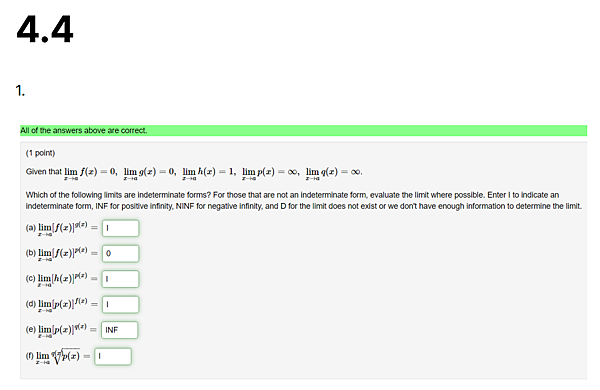








Given that limx→af(x)=0, limx→ag(x)=0, limx→ah(x)=1, limx→ap(x)=∞, limx→aq(x)=∞.
Which of the following limits are indeterminate forms? For those that are not an indeterminate form, evaluate the limit where possible. Enter I to indicate an indeterminate form, INF for positive infinity, NINF for negative infinity, and D for the limit does not exist or we don't have enough information to determine the limit.
(a) limx→a[f(x)]g(x)=
(b) limx→a[f(x)]p(x)=
(c) limx→a[h(x)]p(x)=
(d) limx→a[p(x)]f(x)=
(e) limx→a[p(x)]q(x)=
(f) limx→ap(x)−−−−√q(x)=
Other Indeterminate Expressions: Find the indicated limits. You may have to manipulate your expression before the applying the Rule of L'Hopital. Enter the letter "D" if the limit does not exist.
Suppose p(x) is a polynomial of degree greater than 0. Then
limx⟶∞p(x)ex= and
limx⟶∞p(x)lnx= .
limx⟶0(1+x)1/x= .
limx⟶∞(1+1x)x= .
limx⟶∞(1+1x)2x= .
limx⟶0+xx= .
limx⟶0+xxx=
Evaluate the following limit:
Enter -I if your answer is −∞, enter I if your answer is ∞, and enter DNE if the limit does not exist.
Limit =
Find the limit. Use l'Hospital's Rule if appropriate. Use INF to represent positive infinity, NINF for negative infinity, and D for the limit does not exist.
limx→17lnx−7x−1=
Evaluate the limit using L'Hospital's rule if necessary.
Answer:
Find the following limit.
Notes: Enter "DNE" if limit Does Not Exist.
limx→+∞(1+12x)−6x =
If x, and y are both positive, evaluate
limp→0ln(0.4xp+0.6yp)p=
and limp→0(0.4xp+0.6yp)1/p=
Evaluate the limit below, given that
limt→+∞f(t)=





 留言列表
留言列表


